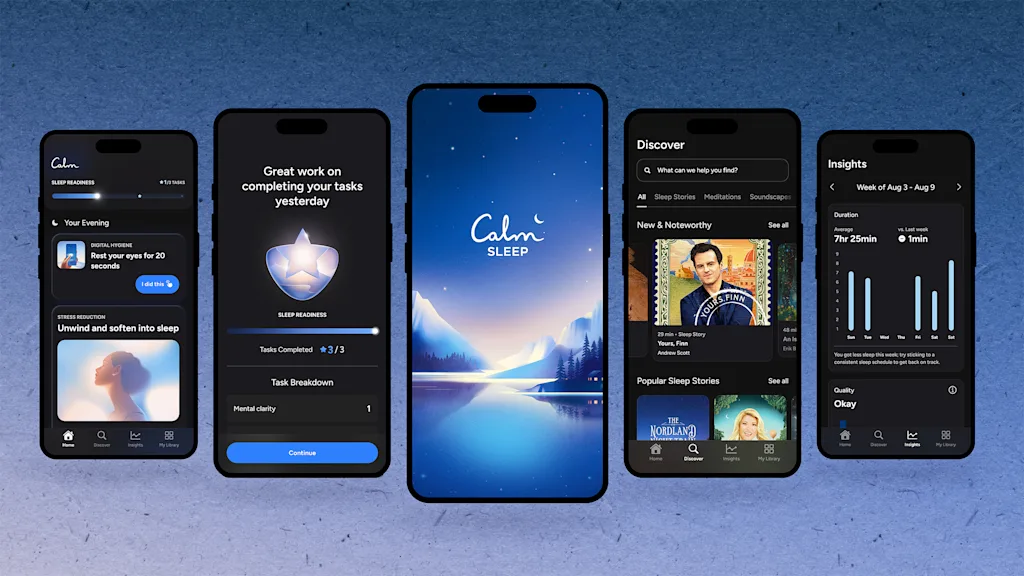Meditation app maker Calm is no stranger to helping people sleep—users have played its bedtime stories more than 1 billion times in the decade they’ve been available. But with the new Calm Sleep app, it’s helping people build habits that will help them sleep better overall.
The CDC reports that as of 2022, more than a third of American adults aren’t getting the recommended seven hours of sleep a night. That lack of sleep seems to be coming to a head, with a 2024 survey from Sleepopolis showing that 92.6% of American adults want to improve the quality of their sleep, and that more than half of those surveyed said they planned to purchase a sleep product in the next year.
“When you see all this put together, we just felt it was really important to have more of an end-to-end experience going forward in sleep,” says David Ko, CEO of Calm. The new Calm Sleep builds on demand for existing tools within Calm while helping users adjust their lifestyles to improve their sleep quality.
[Photo: Courtesy of Calm]
The big business of sleep
Sleep has been a growing market for nearly a decade, and it’s not slowing down. 2025 has seen big funding rounds for companies that make devices focused on measuring or optimizing sleep quality.
Health tracker Oura raised $200 million in December 2024, and smart mattress maker Eight Sleep raked in $100 million in August. Calm—which was last valued at $2 billion when it completed a series C funding in late 2020—thinks it has an opportunity to turn its already strong position in sleep, built by its meditation app, into a distinct product.
“So many devices out there either help you get to sleep, like Calm today, or they tell you how you slept, but they don’t give you the checks and balances you need to prep throughout the day,” says Ko.
What does Calm Sleep do?
For $69.99 a year (or $19.99 per year on top of an existing Calm subscription), Calm Sleep personalizes sleep plans for users based on answers to a questionnaire about their habits.
The result is a list of assignments like Leave your phone in another room for 30 minutes, Skip the caffeine after 12 p.m., and Take two minutes to reflect on how today felt—that will fill a readiness bar leading up to a desired bedtime of the user’s choosing. When it’s full, users are ready for a high-quality night of sleep, the company says.
[Photo: Courtesy of Calm]
Beyond the app
Calm is supporting the Calm Sleep launch with various products that will roll out by the end of the year. Starting October 1, the Tempo by Hilton New York Times Square will feature hotel rooms designed for optimal sleep, including upgraded mattresses, cooling pillows, blackout shades, and Calm Sleep content built into the rooms’ TVs.
It’s also planning a collaboration with Ozlo Sleepbuds blending Calm’s Sleep Stories with the earbuds’ sleep detection technology, and will sell a line of of bedding at Target in December. The hotel stay and Sleepbuds will come with a free year of Calm Sleep, while each product purchased from Target comes with a free month of the app.
[Photo: Courtesy of Calm]
The broad approach to supporting the Calm Sleep launch, Ko says, is designed to highlight the company as more than its mainstay meditation app (which has been downloaded 180 million times), and a partner for its users’ health.
“This launch is just the beginning,” Ko says. “We are continuing to invest in your consumer health journey, and sleep is such an integral part of that.”
The application deadline for Fast Company’s Most Innovative Companies Awards is Friday, October 3, at 11:59 p.m. PT. Apply today.


